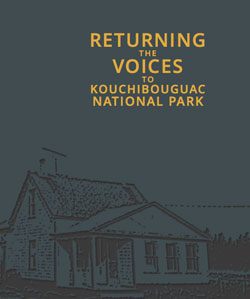Website returns voices of the displaced

Until the 1970s Canada's national parks were created by removing residents who occupied the targeted lands, all in the belief that visitors would not be able to appreciate nature if there were a human presence.
This practice rarely resulted in opposition, but in the case of Kouchibouguac National Park there was
significant resistance, particularly from Acadians who made up the vast majority of the 1,200 displaced people. Having been deported by the British in the 18th century, many Acadians viewed their removal from Kouchibouguac in 1969 as "une deuxième déportation."
Nearly a half-century later, a history professor at Concordia University is helping to return the voices, stories and lives of these displaced people to their former lands along the east coast of New Brunswick.

Having spent years speaking to the former residents of Kouchibouguac, Ronald Rudin decided to develop the new website, Returning the Voices to Kouchibouguac National Park. The interactive site uses video, maps, texts and illustrations to tell a wide range of stories inspired by the experiences of these people who were forced to leave their lives and livelihoods.
The website, created in collaboration with Montreal-based multimedia producer Philip Lichti, brings former residents of Kouchibouguac back to the park through a series of intimate video portraits. Many of these videos feature residents telling their stories while standing on the lands they once called home, reflecting on the painful memories now associated with that space.
“These people were poor, but they had built rich lives around the resources of the region – the forests, the land and especially the waters that they fished,” explains Rudin. “The statistics that led to the conclusion that they were
impoverished didn’t take into account the fish and farm products that they consumed, or the barter that often took place between families. So the government conveniently wrote these residents off as worthless, and sent them away to fend for themselves.”
This resulted in a public outcry that painted the Kouchibouguac story as one of resistance. “The opponents to the creation of the park became symbols of a greater assertiveness among Acadians who were experiencing their own révolution tranquille at the time,” explains Rudin.
“But in in emphasizing the dramatic conflict between angry residents and government officials, the experience of the vast majority of the residents was lost. The story of resistance was part of what happened at Kouchibouguac, but most families quietly left their lands to create new lives, often within kilometres of the borders of the park. Theirs are the stories I wanted to tell.”
Rudin’s website valorizes the lives and experiences of these displaced people by introducing their voices to a new generation of Acadians – and Canadians – who are sure to be moved by the personal accounts that span the full spectrum of human emotions.
Although the Kouchibouguac experience ultimately convinced Parks Canada to end the practice of forced removal, the residents who were displaced to allow the national park’s creation can never return to their lands. This project makes it possible for some of their voices to return, if only virtually.
Watch the video where Norma Doucet describes her life growing up in Fontaine, one of the communities destroyed to create Kouchibouguac National Park:
Related links:
• Returning the Voices to Kouchibouguac National Park: http://returningthevoices.ca/
• Concordia University’s Department of History: http://history.concordia.ca/index.php
• Ronald Rudin’s Research @ Concordia profile: http://www.concordia.ca/explore/#!/profile/9/